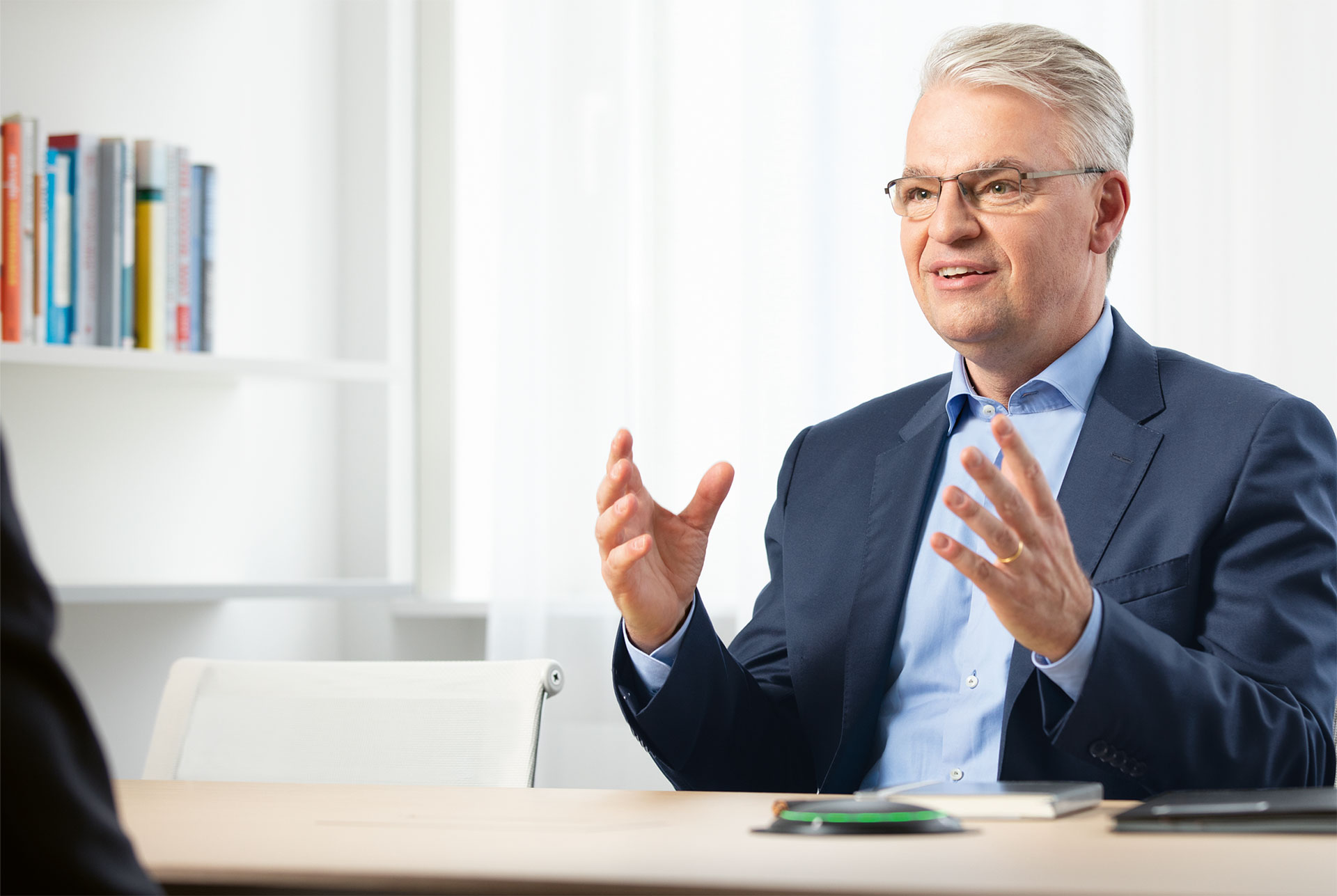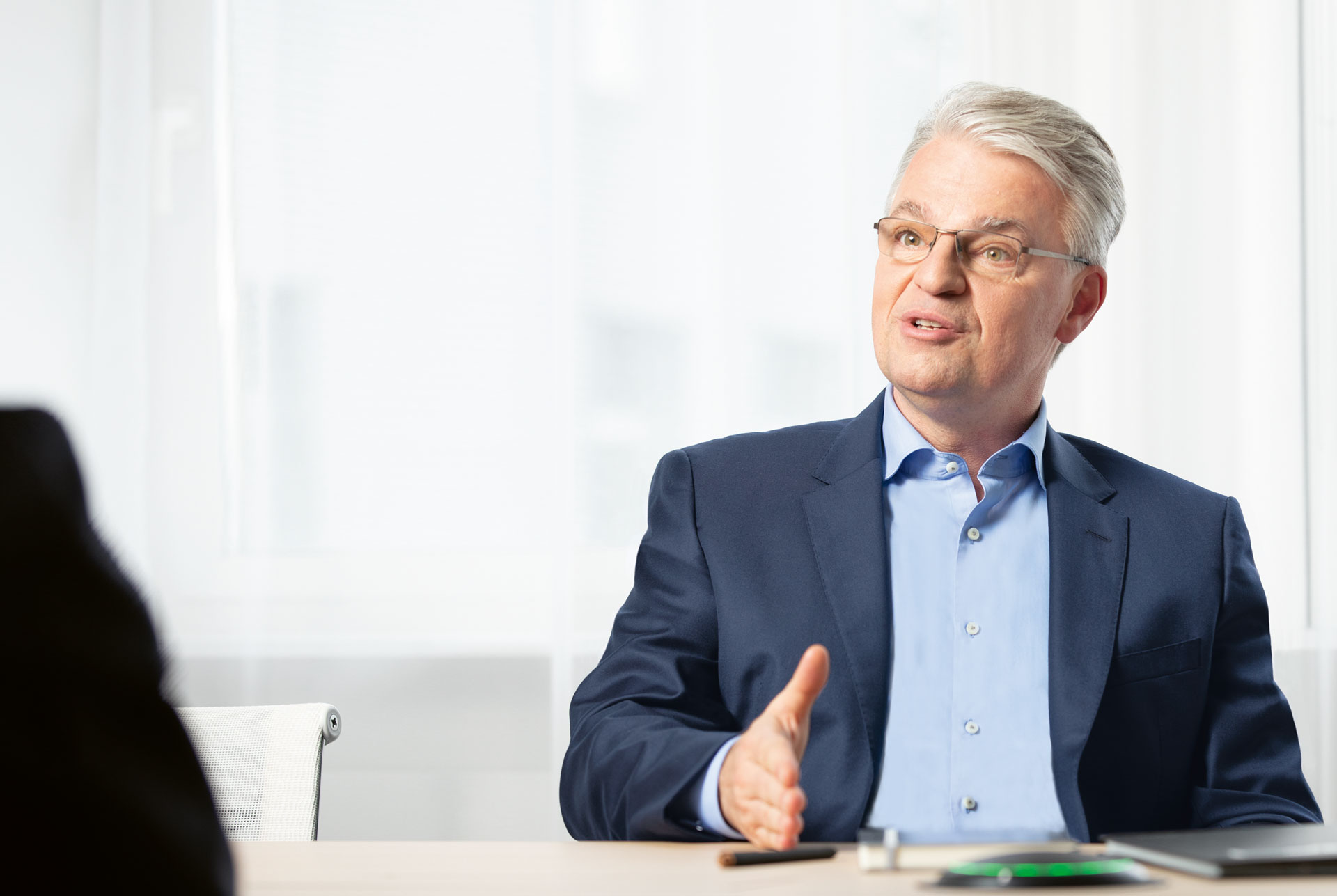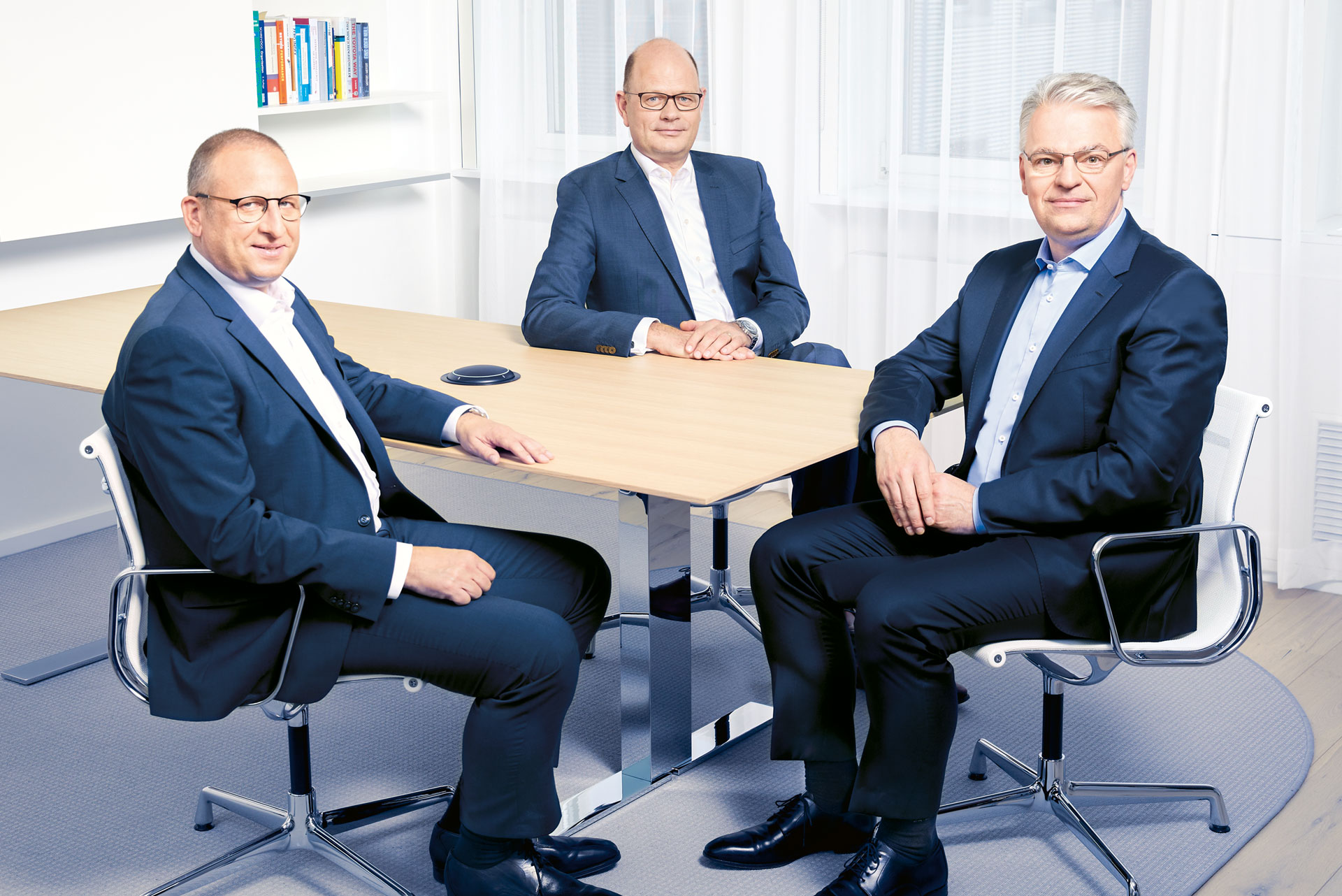INTERVIEW WITH THE EXECUTIVE BOARD CHAIRMAN
"I see fantastic opportunities for Aurubis, especially in recycling"
MR. HARINGS, YOU’VE BEEN AT THE HELM OF AURUBIS FOR ABOUT HALF A YEAR NOW. How were your FIRST FEW MONTHS?
Harings: They were both very exciting and very intense. I’m pleased with the warm welcome I received at Aurubis, and I’m proud to be part of this dedicated team. But I also came during a phase of far-reaching decisions for the company, so there wasn’t much time to get settled.
THAT’S TRUE. IN THE FIRST MONTH OF YOUR TERM, YOU WERE ABLE TO ANNOUNCE THE ACQUISITION OF THE METALLO GROUP.
Harings: Right, a crucial transaction for our company, and a very positive one at that. The acquisition of the Metallo Group, which is still subject to approval by the European Commission, will take us to a new level in multi-metal processing. The combination of the two complementary business models considerably strengthens our portfolio in metals of the future, such as nickel, tin, zinc, and lead. It makes us a leading solution provider in Europe when it comes to processing complex recycling raw materials. Metallo and Aurubis are also united by their efforts towards sustainable metal production: together, we’ll recover even more environmentally friendly and recycled material. This is something that is very important to me. And something that we have to preserve in Europe.
"We’re still on the right track with our multi-metal strategy. And we’ll continue to implement this approach."ROLAND HARINGS

SPEAKING OF EUROPE: POLICYMAKERS ARE STRIVING FOR CARBON NEUTRALITY BY 2050. WHAT DOES THAT MEAN FOR AURUBIS?
Harings: I’m convinced that we have to make our production processes as carbon-neutral as possible. And my goal is to achieve this as quickly as possible. As an industrial company, we’re already working intensively on being part of the solution for the energy shift. We are steadily improving our energy management, optimizing material cycles within our value chain, and checking out new ideas and technologies. For example, we’re currently sounding out how we can reduce fossil fuels by using hydrogen in production.
However, the fact is that Aurubis will remain an energy-intensive company now and in the future. That’s the nature of metal manufacturing. As a result, we in Europe have to make sure that metal production stays profitable – otherwise, its existence is at risk. We need reliable conditions at the political level to ensure our international competitiveness.
WHAT ARE SOME CURRENT, CONCRETE EXAMPLES OF CO2 REDUCTION?
Harings: For one, there’s our award-winning Industrial Heat project, which already reduces about 20,000 t of CO2 annually and has the potential to reduce up to 140,000 t. That alone accounts for over 90 % of the voluntary CO2commitment that Hamburg companies have agreed on. Another example is our power-to-steam plant, which went online this year. It can reduce CO2 emissions by up to 4,000 t per year by using renewable energies. But to be very clear: we achieve a large part of this reduction outside of the plant boundaries. This means that it is only offset against our CO2 emissions to a limited extent. Nevertheless, this isn’t a reason to avoid implementing such meaningful projects.

"We’ll once again take a closer look at growth opportunities abroad."ROLAND HARINGS
THIS IS A TOPIC THAT OBVIOUSLY MEANS A GREAT DEAL TO YOU.
Harings: Absolutely. Another issue that’s also important to me personally is occupational health and safety. In this area, Aurubis hasn't gotten to where we want to be yet. We’ll therefore work more consistently on this in the future, especially when it comes to substantially reducing the number of accidents and injuries. Among other things, we’ve developed a new communication concept for this purpose, called 10forZero. It combines new communication materials with modern training units. All of these measures together have to lead to a change in employee conduct so that we can quickly reach our long-term vision of zero accidents and injuries.
YOU HAD TO STOP A COMPLETELY DIFFERENT PROJECT IN 2019 – FUTURE COMPLEX METALLURGY, OR FCM FOR SHORT. CAN YOU SAY ANYTHING ABOUT THE reason for THIS DECISION?
Harings: Of course. First of all, however, it’s important for me to emphasize that halting the internal growth project FCM, with which we had wanted to process higher volumes of complex material, was fully detached from our multi-metal strategy. We’re still on the right track with the strategy and we’ll continue to implement it. The best example is the acquisition of the Metallo Group, which has more than ten years of experience in multi-metal recycling alone.
But back to FCM: the Executive Board and Supervisory Board made the decision in June to discontinue the project in its current form. Why? In particular, because it became clear at that point in time that the project would require much higher investments than planned. We therefore wouldn’t have been able to maintain our profitability targets anymore. This decision was not easy for us, but it was the right step to take, especially since none of the key facilities had been ordered at that point yet. We are now fully documenting the project with the core team. Nothing is lost, we’re just back to square one. Following the successful integration of Metallo, we will look at the material flows in the expanded smelter network again in more detail. At that point, we will discuss what additional multi-metal projects will be implemented in the future.
YOU’VE DESCRIBED 2018/19 AS A TRANSITIONAL YEAR FOR AURUBIS. WHERE DO YOU SEE THE GREATEST CHALLENGES?
Harings: The past fiscal year has shown that we definitely have some internal homework to
do to make ourselves fit for the future. The unplanned shutdowns in the plants and our cost
basis are two key topics I’d like to mention here. Without a doubt, 2018/19 was a transitional
year during which we had to equip ourselves for multiple large-scale maintenance shutdowns.
In Hamburg alone, we invested approximately € 50 million in around 450 individual projects for
this purpose in the fall. To give you an idea: in addition to 750 of our own employees, about
1,200 employees from partner companies worked during these shutdowns – around the clock! It’s
also clear that unplanned downtimes can’t happen to the extent that they did in the past fiscal
year. We have to improve in this area. Our research and development activities will therefore
concentrate more strongly on optimizing operating processes in the future.
While we’re talking about challenges, we should also discuss the markets. Our business is influenced by different market developments that we have zero or very little control over. During the past year, we closely monitored topics such as the global capacity buildup on the mine and smelter side, the weakening global and European economy due in large part to trade conflicts, and the sagging global metal demand that ensued. Although we view some of these effects as temporary and look positively to the future in light of the healthy fundamental data regarding the metal markets, we still have to keep one thing in mind: to ensure our success on the market in challenging times, it’s crucial that we position ourselves more efficiently internally and continue to pursue our strategy.
HAVE YOU ALREADY OUTLINED ANY MEASURES THAT WILL SHAPE YOUR FIRST YEARS AT AURUBIS?
Harings: Yes, absolutely. Our multi-metal strategy will of course be the focus of my
attention, along with the successful integration of the Metallo Group. However, this also
includes finding a meaningful solution for our Segment Flat Rolled Products since the European
Commission prohibited the sale in February 2019. We stand by our intention to sell Segment FRP.
As soon as we’re on the right track with that, we’ll once again take a closer look at growth
opportunities abroad. We have the financial means, with available funds exceeding € 1 billion.
And I already addressed our cost basis earlier. With our top-down efficiency improvement program and the Aurubis Operating System, or AOS for short, we’ve achieved important project success in the last three years, uncovering inefficiencies and driving continuous development. Our internal AOS consultants will continue this throughout the company in the future in the new department Group Process Management. We want to keep making our processes leaner and push digitalization forward in the Group.
Nevertheless, we intend to go one step further in the future, placing a stronger focus on the cost side. We’ll identify corresponding measures at all of the sites and start implementing them promptly. We of course plan to report on these measures at regular intervals. However, what’s even more important to me is that we see the results in the company’s success.
LET’S CLOSE on a different subject. WHAT is it ABOUT AURUBIS that EXCITES YOU THE MOST?
Harings: I can think of a number of things. First and foremost, the people. I’ve now visited most of our sites and I’m delighted by the enthusiasm the “Aurubians” have for their work, and by the fact that many colleagues come to me with new ideas. And then there are of course our products, our metals. We’re truly at the place where the future is being created. Copper is the metal of the energy shift. Renewable energies require up to twelve times more copper than conventional energy systems. And we produce this copper today from recycled material to a large extent, under the strictest environmental standards in the world. And I see fantastic opportunities for Aurubis, especially in recycling.
AND WHAT IS YOUR PERSONAL WISH FOR THE CURRENT FISCAL YEAR?
Harings: I would be happy for more positive news to dominate again. We invested extensively in our facilities in 2018/19 and learned a great deal. The company has to secure its operating performance. Together with all Aurubis employees, we on the Executive Board team want to lead the company to a successful future. We’re confident that the potential is there. I, personally, will put all of my energy into implementing this as well. And we’ll be successful if we all focus on our strengths.

"Together with all Aurubis employees, we on the Executive Board team want to lead the company to a successful future."
The interview was conducted by Angela Seidler, Vice President Investor Relations & Corporate Communications.
